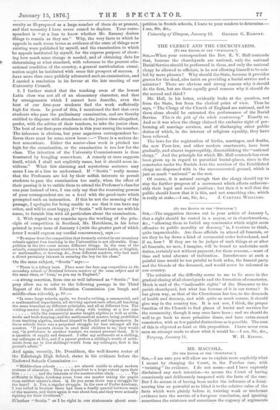[TO THE EDITOR OF THE SPECTATOR."] SIR,—The suggestion thrown out
in your article of January 1, that a right should be vested in a mayor, or in churchwardens, •
&c., "allowing them to forbid any ceremonies which might seem offensive to public morality or decency," is, I venture to think, quite impracticable. Are these officials to attend all funerals, or are they to lay down a kind of ceremonial order beforehand, and if so, how ? If they are to be judges of such things at or after all funerals, no men, I imagine, will be found to undertake such duties, certainly not without payment, for these reasons,—want of time and total absence of inclination. Interference at such a painful time would be too painful to both sides, the funeral party and the friends of the deceased, and would never be tolerated in our country.
The solution of the difficulty seems to me to lie more in the gradual closing of all churchyards and the formation of cemeteries. Much is said of the "inalienable rights" of the Dissenter to the parish churchyard, but what has become of it in our towns? It has given way, as that of the Churchman has too, to the demands of health and decency, and with quite as much reason, it should
give way in the country too. It is not now, I think, the proper function of the Churoh to find places of burial and services for the community, though it may once have been ; and we should do well to go back to more primitive times, and have extra-mural cemeteries, with as few painful distinctions as is possible. The cost of this is objected as fatal to this proposition. I have never even seen an attempt made to show what it would be.—! am, Sir, &c.,


































 Previous page
Previous page